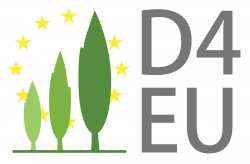D4EU´s Austrian partner Wood K lus gives first insights to the Life Cycle Assessment (LCA) in value chain establishment. Learn more about the initial methodological approach and preliminary results: D5.2_Integration of LCA in value chain establishment_Methodological Approach_WoodKPlus_final
The establishment of D4EU´s poplar plantations for bio‐based materials will provide new economic opportunities (e.g. crop diversification, increase of revenues especially on bad soils) and environmental advantages (e.g. new habitats because of reduced agricultural impact, soil remediation). Furthermore, the plantations offer an optimized energy-input to energy‐output ratio of the cropping system, carbon sequestration and reduction of greenhouse gasses (GHG) emissions compared to non‐renewable production systems.
Besides these benefits, the establishment of poplar plantations and the bio‐based value chain also involves environmental challenges, as potentially reduced groundwater recharge or tilling of grasslands. These must be analyzed in order to provide guidance on the establishment of sustainable value chains within the D4Eu project.
The Life Cycle Assessment (LCA) attempts to identify sustainability levers within the value chains. These outcomes are of core value for the industrial partners and project developers, as the conclusions aim to support the decision-making for the different technological processes and production management. Consequently, as a first step of the LCA study (task 5.2), the objective of this progress report is to develop and depict the initial methodological approach for performing the environmental assessment. A literature review on previous LCA studies, especially those focusing on bio‐based systems, and R&D LCA was carried out in order to review the state‐of‐the‐art.
